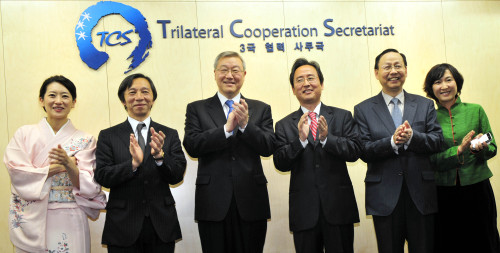South Korea collaborated with Japan and China in launching the Trilateral Cooperative Secretariat Tuesday.
Attending the ceremony, South Korean Foreign Minister Kim Sung-hwan said the trilateral body will “play a vital role” in the “systemized mechanism for peace and prosperity of Northeast Asia.”
The vision long sought by the three sides has become “not only a symbol, but reality,” the minister said during the ceremony attended by several top diplomats from each country including Japanese Ambassador to South Korea Masatoshi Muto, Chinese Ambassador to South Korea Zhang Xinsen and the secretariat’s current leadership Secretary-General Shin Bong-Kil.
Japanese Ambassador Muto stressed the shared responsibilities of the three neighbors.
“The idea of trilateral cooperation comes from the fact that we three countries share common responsibilities and future visions to create regional and international peace, prosperity and a sustainable future,” he said. “We must strengthen future-oriented cooperation under the principle of openness, transparency, mutual trust, common benefit and respect of various cultures, as our leaders have agreed.”
The Chinese ambassador called the three states “great influences both in Asia and in the world.”
“To strengthen trilateral cooperation will not only benefit the peoples of the three countries, but also contribute to peace and development in Northeast Asia as well as in the whole world,” he said.
 |
Officials from South Korea, Japan and China clap their hands in a ceremony to open the Trilateral Cooperative Secretariat in Seoul on Tuesday. From left are Counselor at the Japanese Embassy in Korea Matsukawa Rui, Japanese Ambassador to South Korea Masatoshi Muto, Foreign Minister Kim Sung-hwan, the secretariat’s Secretary-General Shin Bong-kil, Chinese Ambassador to South Korea Zhang Xinsen and Director of the Office for Korean Peninsula of the Chinese Foreign Ministry Mao Ning. (Kim Myung-sub/The Korea Herald) |
Counselor at the Japanese Embassy in Korea Matsukawa Rui and Director of the Office for Korean Peninsula of the Chinese Foreign Ministry Mao Ning have each been named deputy secretary-general of the organization, which commenced operation on Sept. 1 and will operate under a rotating leadership structure.
The secretariat holds significant potential in the context of Korea’s regional diplomacy and influence over the Northeast Asian economy, despite persisting issues and disputes among the three countries, Secretary-General Shin had told The Korea Herald.
Shin will serve for two years after which the post will be passed to another state.
South Korean President Lee Myung-bak first proposed setting up the permanent organization during a summit in Beijing in 2009, with an eye on such international bodies as the European Union or Association of Southeast Asia Nations.
South Korea, Japan and China forged a final agreement on the establishment of a cooperative secretariat in December, vowing strong partnership on economy and regional security issues over the next decade.
Functions of the secretariat will include administrative and technical support of the three-way summits and meetings of foreign ministers, developing and assessing new cooperation projects as well as research on major issues of trilateral collaboration, according to Seoul’s Foreign Ministry.
The three states have concluded 17 ministerial conferences and more than 50 official dialogues. A permanent secretariat will ultimately enable these disparate dialogue mechanisms to be better coordinated, thus reducing inefficiencies in the current processes, officials at the secretariat said.
By Shin Hae-in (
hayney@heraldcorp.com)





![[Herald Interview] 'Trump will use tariffs as first line of defense for American manufacturing'](http://res.heraldm.com/phpwas/restmb_idxmake.php?idx=644&simg=/content/image/2024/11/26/20241126050017_0.jpg)


